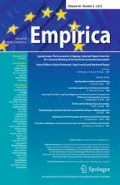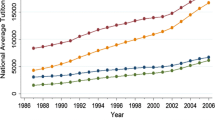Abstract
This paper empirically evaluates the impact of fiscal decentralization on the performance of higher education systems. To test this relationship, we build up a panel dataset composed of European countries. Country-level performance is measured by an indicator using data from the Shanghai ranking. Using a dynamic panel approach, we find that a higher share of government spending coming from decentralized levels of governments leads to an improvement of the performance of research-intensive higher education institutions. We argue that a more decentralized higher education system increases the ability to attract and retain top scholars.
Similar content being viewed by others
Notes
This is likely to be a good proxy of regulatory autonomy as well, in the absence of data on the decentralization of the governmental regulation taking place in the sector. One reason is that most of the public funding granted comes with some strings attached to it that are set by the government granting it.
Table 5 in the appendix presents statistics by country.
For schools ranked after the \(100^{th}\) position of the ranking, schools are lumped in categories, e.g. between 101 and 150. Based on the indicators and their weights used to build up the precise ranking, we retrieve the precise rank of each schools that are ranked.
As a robustness test we also introduce different amount of lags but it does not change our main results. See the robustness section below.
A Hausman test reveals that the results of the fixed-effects approach differ significantly from those of a random-effects approach.
Note that when using spending in \(\%\) of GDP as a dependent variable, the size of our sample increases. Restricting our analysis on the same sample as our main analysis does not impact our result.
A side effect of considering time lags between our explanatory and our dependent variable is that it undermines the presence of reverse causality, another source of endogeneity.
References
Aghion P, Dewatripont M, Hoxby C, Mas-Colell A, Sapir A (2008) Higher aspirations: an agenda for reforming European Universities. Technical Report, Bruegel blueprint
Arellano M, Bond S (1991) Some tests of specification for panel data: monte carlo evidence and an application to employment equations. Rev Econ Stud 58:277–297
Barankay I, Lockwood B (2007) Decentralization and the productive efficiency of governement: evidence from Swiss Cantons. J Public Econ 91:1197–1218
Bardhan P, Mookherkee D (2000) Capture and governance at local and national levels. Am Econ Rev 90:135–139
Baskaran T, Feld L, Schnellenbach J (2016) Fiscal federalism, decentralization, and economic growth: A meta-analysis. Econ Inq 54:1445–1463
Beck T, Groff G, Keefer P, Walsh P (2001) New tools in comparative political economy: the database of politcal institutions. World Bank Econ Rev 15:165–176
Beine M, Noel R, Ragot L (2014) Determinants of the international mobility of students. Econ Educ Rev 41:40–54
Belleflamme P, Hindricks J (2005) Yardstick competition and political agency problems. Soc Choice Welfare 24:155–169
Besley T, Case A (1995) Incumbent behavior: vote seeking, tax setting and yardstick competition. Am Econ Rev 85:25–45
Blochliger H, Egert B, Bonesmo Fredriksen K (2013) Fiscal federalism and its impact on economic activity, public investment and the performance of educational systems. OECD Economics Department Working Papers
Blundell R, Bond S (1991) Initial conditions and moment restrictions in dynamic panel data models. J Econom 87:115–143
Bruno GS (2005) Approximating the bias of the LSDV estimator for dynamic unbalanced panel data models. Econ Lett 87:361–366
Channa A, Faguet J-P (2016) Decentralization of health and education in developing countries: a quality-adjusted review of the empirical literature. World Bank Research Observer
Cohn E, Rhine S, Santos M (1989) Institutions of higher education as multi-product firms: economies of scale and scope. Rev Econ Stat 71:284–290
David Q (2013) Determinants of research production at top US universities. B.E. J Econ Anal Policy 13:81–109
Diaz-Serrano L, Meix-Llop E (2019) Decentralization and the quality of public services: cross-country evidence from educational data. Environ Plan C Polit Space
Enikolopov R, Zhuravskaya E (2007) Decentralization and political institutions. J Public Econ 91:2261–2290
European University Association (2017) University Autonomy in Europe. www.university-autonomy.eu
Faguet J-P, Sanchez F (2008) Decentralization’s effects on educational outcomes in Bolivia and Colombia. World Dev 36:1294–1316
Faguet J-P, Sanchez F (2014) Decentralization and access to social services in Colombia. Public Choice 160:227–249
Falch T, Fischer J (2012) Public sector decentralization and school performance: international evidence. Econ Lett 114:276–279
Gerard M, Gilson N, Ruiz F (2012) Higher education and firms: on the interaction between research and regional policies. Int Tax Public Finance 19:333–367
Hanushek E, Woessmann L (2011) The economics of international differences in educational achievement. In: Handbook of the economics of education. Elsevier, Amsterdam
Jacqmin J, Lefebvre M (2016) Does sector-specific experience matter? The case of European higher education minister. Res Policy 45:987–998
Judson RA, Owen AL (1999) Estimating dynamic panel data models: a guide for macroeconomists. Econ Lett 65:9–15
Justman M, Thisse J-F (2000) Local public funding of higher education when skilled labor is imperfectly mobile. Int Tax Public Finance 7:247–258
Kiviet J (1999) Expectations of expansions for estimators in a dynamic panel data model; some results for weakly exogenous regressors. In: Hsiao C, Lahiri K, Lee L, Pesaran M (eds) Analysis of panels and limited dependent variable models. Cambridge University Press, Cambridge
Ligthart JE, van Oudheusden P (2017) The fiscal decentralisation and economic growth nexus revisited. Fiscal Stud 38:141–171
Luca M, Smith J (2013) Salience in quality disclosure: evidence from the US News college rankings. J Econ Manag Strat 22:58–77
Martinez-Vazquez J, Lago-Penas S, Sacchi A (2017) The impact of fiscal decentralization: a survey. J Econ Surv 31:1095–1129
Nickell SJ (1981) Biases in dynamic models with fixed effects. Econometrica 49:1417–26
Oates W (1972) Fiscal federalism. Harcourt Brace Jovanovich, San Diego
Persson T, Tabellini G (2000) Political economics: explaining economic policy. MIT Press, Cambridge
Rose-Ackerman S (1980) Risktaking and reelection: does federalism promote innovation? J Legal Stud 9(3):593–616
Salinas P, Solé-Ollé A (2018) Partial fiscal decentralization reforms and educational outcomes: a difference-in-differences analysis for Spain. J Urban Econ 107:31–46
Seabright P (1996) Accountability and decentralization in government: an incomplete contracts model. Eur Econr Rev 40:61–89
Tiebout C (1956) A pure theory of local expenditures. J Polit Econ 64:416–424
World Bank (2000) Entering the 21st century, World Development Report. Technical Report, World Bank
Author information
Authors and Affiliations
Corresponding author
Additional information
Publisher's Note
Springer Nature remains neutral with regard to jurisdictional claims in published maps and institutional affiliations.
Appendix
Rights and permissions
About this article
Cite this article
Jacqmin, J., Lefebvre, M. Fiscal decentralization and the performance of higher education institutions: the case of Europe. Empirica 48, 743–758 (2021). https://doi.org/10.1007/s10663-020-09489-z
Published:
Issue Date:
DOI: https://doi.org/10.1007/s10663-020-09489-z




